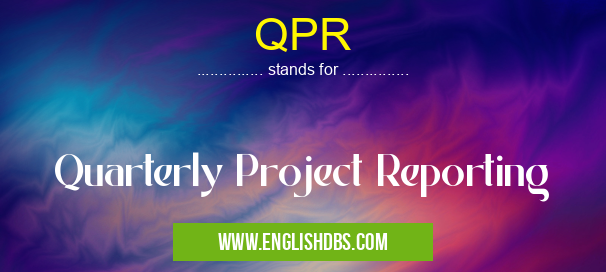What does QPR mean in UNCLASSIFIED
QPR stands for Quarterly Project Reporting. It refers to reporting that is done every three months to provide an update on the progress of a project. This type of reporting is common in project management to keep stakeholders informed and ensure that the project is on track.

QPR meaning in Unclassified in Miscellaneous
QPR mostly used in an acronym Unclassified in Category Miscellaneous that means Quarterly Project Reporting
Shorthand: QPR,
Full Form: Quarterly Project Reporting
For more information of "Quarterly Project Reporting", see the section below.
Purpose of QPR
- To track project progress: QPRs provide a regular update on the project's progress, including milestones achieved, deliverables completed, and any deviations from the original plan.
- To identify potential risks: QPRs can help identify potential risks that may impact the project's timeline, budget, or scope.
- To make informed decisions: QPRs provide valuable information to stakeholders, allowing them to make informed decisions about the project's direction and resource allocation.
- To maintain transparency: QPRs help maintain transparency by providing regular updates to all stakeholders involved in the project.
Components of QPR
- Project Overview: A brief summary of the project's objectives and scope.
- Progress Summary: A detailed report on the work completed, milestones achieved, and deliverables delivered during the quarter.
- Financial Summary: An update on the project's budget, including expenses incurred and funds remaining.
- Risk Assessment: An analysis of potential risks that may impact the project and mitigation strategies.
- Action Plan: A list of actions planned for the next quarter, including key milestones and deliverables.
Essential Questions and Answers on Quarterly Project Reporting in "MISCELLANEOUS»UNFILED"
What is Quarterly Project Reporting (QPR)?
Quarterly Project Reporting (QPR) is a regular reporting process that provides project stakeholders with detailed information about the project's progress, challenges, risks, and achievements over a three-month period. It serves as a valuable tool for tracking project performance, identifying areas for improvement, and ensuring that the project remains on track to meet its goals.
Why is QPR important?
QPR is crucial for effective project management as it allows stakeholders to:
- Monitor project progress and identify any deviations from the plan
- Identify and address potential risks and challenges proactively
- Assess the effectiveness of project strategies and make necessary adjustments
- Communicate project status and achievements to key stakeholders
- Provide a basis for decision-making and resource allocation
What elements are typically included in a QPR?
A comprehensive QPR typically includes the following elements:
- Project overview and objectives
- Summary of progress made during the quarter
- Detailed status of key project deliverables
- Analysis of project performance against targets
- Identification of risks and challenges
- Mitigation strategies for identified risks
- Financial status and resource allocation
- Planned activities for the next quarter
Who is responsible for preparing QPRs?
Typically, the project manager is responsible for preparing and submitting QPRs. They gather information from the project team, analyze data, and present a clear and concise report to stakeholders.
How often should QPRs be submitted?
QPRs are typically submitted on a quarterly basis, coinciding with the project's financial reporting cycle. However, the frequency may vary depending on the size and complexity of the project.
What is the difference between QPR and MPR?
QPR (Quarterly Project Reporting) focuses specifically on the progress and performance of a project over a three-month period. MPR (Monthly Project Reporting), on the other hand, provides more frequent updates on the project's status, typically on a monthly basis. MPRs are often used to monitor short-term progress and identify any immediate issues that require attention.
Final Words: QPRs are a crucial tool in project management, providing regular updates and ensuring transparency throughout the project lifecycle. They help stakeholders stay informed, identify potential risks, make informed decisions, and keep the project on track. By adhering to best practices and providing accurate and timely QPRs, project managers can enhance communication, improve decision-making, and increase the chances of project success.
